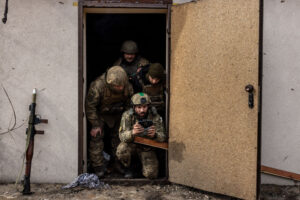On 16 December 2022, the most significant territorial breach in Nato’s history took place, but the chances are you didn’t hear about it. That day — almost a month after a presumed-to-be errant Ukrainian air defence rocket made international headlines when it killed two civilians in southeastern Poland — another object crossed Poland’s eastern border and travelled for hundreds of kilometres before landing just west of Bydgoszcz, a mid-sized city in the North. This time, however, the incident was kept secret from the public. It wasn’t until April this year that the object was discovered, by a random passerby walking in a forest, and it wasn’t until last week that military analysts determined it to be a Russian Kh-55 cruise missile, capable of carrying a nuclear warhead.
A political blame game has since erupted in Poland. Both Prime Minister Mateusz Morawiecki and Defence Minister Mariusz Błaszczak have denied being aware of the incident when it took place, with the latter implying that members of the Polish armed forces had obfuscated it in official reports at the time — a claim which seems unlikely.
However, regardless of who is to blame, the episode reveals a state hierarchy vastly underprepared to protect Poland, and by extension the rest of Nato, from Russian threats. Not only did a missile manage to fly over more than half the country, including potentially over its capital Warsaw, without being shot down, but the Polish government chose to keep emergency services in the dark rather than risking attracting media attention, despite the threat to civilian lives. After it landed, authorities allegedly called off the search without locating the missile, reportedly refusing to widen it for similar reasons — even though no one at that time knew what sort of payload the Kh-55 had been carrying. It’s a wonder no one was hurt.
The fact that the missile didn’t hit any civilian infrastructure appears to have been a stroke of luck. Some commentators in the Polish media have noted that, had it continued on its course, the missile could have hit a key LNG terminal near Poland’s border with Germany, which would have endangered the region’s energy security. And if the missile’s angle of flight had been just slightly different, we may instead have witnessed an assault on Poland’s eighth-largest city, which would have seen civilian casualties and potentially the invocation of Nato’s Article 5 against Russia.
“This was a significantly more serious incident than anything that had happened previously,” Marek Świerczyński, the head of the security desk at the Polish research institution Polityka Insight, told me. “I imagine that all the decision-makers and military leaders who knew about this were sweating from head to toe, and were praying to all the gods they knew that this wasn’t an attack, that this wasn’t war.”
The Polish government has never revealed whether contact with the Russian side ever took place, and although it’s clear in hindsight that the strike was likely a mistake, there’s no knowing if Poland’s leaders were aware of this on 16 December. With this in mind, the Polish government’s lack of communication and apparent predisposition to hiding facts to save face presents a grave risk not only for Poland’s security, but for Nato’s as well. Although we do not know the full facts of the case, and possibly never will, the strike appears to have exposed vital gaps in the bloc’s security and Poland’s crisis management readiness — gaps that could be exploited by Russia.
What we do know is this: on 16 December, during a Russian missile barrage on targets across Ukraine, the Ukrainians alerted the Polish military to a potential rocket moving towards the Polish border, likely originating over Belarus. The Poles scrambled fighter jets to track the missile. Soon enough, they lost it from their radar systems, as the missile was apparently only in the air over Poland for about half an hour. A single local police patrol was dispatched to search for the missile on the ground, and helicopters also reportedly searched from the air. Both gave up after failing to locate anything out of the ordinary, even though it remained possible that an unexploded ordinance, potentially of a nuclear variety, remained somewhere in the area.
Speculation has swirled about why a missile was able to fly for such a long distance over Nato territory without being neutralised. According to some analysts, Poland’s armed forces are not equipped for continuous tracking of low-flying airborne objects when in a peacetime posture, and it would have been nearly impossible for the jets to catch up with the missile given its head start. But Poland’s missile systems, deployed along the border and around Warsaw, were not activated to meet the threat either. Poland has purchased billions of dollars’ worth of air defence systems in the past year, and already has several US-made Patriot batteries at its disposal. According to Świerczyński, ground-based air defence systems are historically quite poor at engaging targets like this one without a dense array of radar systems at their disposal. But while Poland is still in the process of dramatically upgrading its armed forces, the impression that the nation is unable to secure its airspace with its current capabilities, outside of wartime, is deeply concerning.
There is an even more pressing problem: that political concerns were prioritised over the security of Polish citizens. According to Błaszczak, American fighter jets were dispatched along with Polish ones on 16 December. This would have necessitated communication with US allies, making it highly improbable that the defence minister wouldn’t have been made aware of the incident at the time. Nato’s Secretary General Jens Stoltenberg appeared to confirm that such communication took place this week, making it all the more perplexing that neither Polish nor Nato authorities seemed particularly interested in locating the potentially lethal rocket.
In conversations with Stoltenberg on Monday, Polish President Andrzej Duda implicitly admitted that the system had failed, calling in particular for revised Nato search procedures in such situations. It remains to be seen whether these revisions would extend to the vital procedures that should have taken place in the minutes after the missile was first detected and before it landed.
“The most difficult and important issue is not whether some radar detected something, or if some ground-based air defence system was ready to shoot it down,” Świerczyński said, “but if on the side of Nato and Poland there was clarity on whether this was a mistake or whether this was an attack.” According to the recent Discord leaks about the war in Ukraine, the US has considerable intelligence about Moscow’s moves in the theatre of war. But even so, it would be difficult to imagine that the Americans had advance knowledge about whether this missile had been dispatched toward Poland intentionally — let alone about its payload. Therefore, it was likely that there was no such clarity about the nature of the Kh-55, making the Polish government’s lacklustre response seem all the more irresponsible.
That Poland’s government has learned so few lessons from November’s rocket incident is something that bodes ill not just for Poland, but for many Nato states that have tacitly started to rely on it as a “linchpin of regional security”. Poland has become particularly crucial to guaranteeing the security of natural gas flowing from Norway through pipelines in the Baltic Sea, and to the security of the neighbouring Baltic states. With such growing regional responsibilities, Poland increasingly has little room for error in the security sphere.
We can only hope that this incident serves as a wake-up call for Polish and Nato leaders and paves the way for greater transparency. Poland’s politicians must realise they cannot afford to sacrifice national security for the sake of their political careers. After all, it was a fortunate accident that this Kh-55 failed to cause any real damage or endanger any lives — but next time, we may not be so lucky.
Disclaimer
Some of the posts we share are controversial and we do not necessarily agree with them in the whole extend. Sometimes we agree with the content or part of it but we do not agree with the narration or language. Nevertheless we find them somehow interesting, valuable and/or informative or we share them, because we strongly believe in freedom of speech, free press and journalism. We strongly encourage you to have a critical approach to all the content, do your own research and analysis to build your own opinion.
We would be glad to have your feedback.
Source: UnHerd Read the original article here: https://unherd.com/





